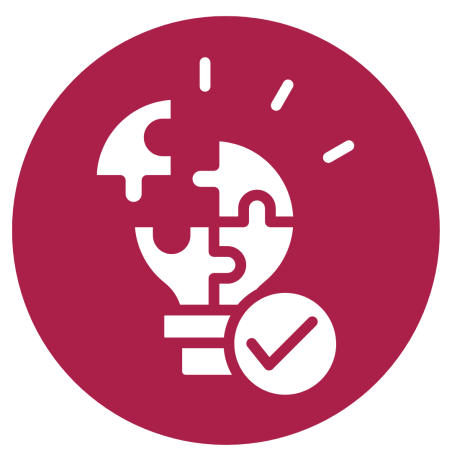The ISTQB® Certified Tester - Test Automation Strategy v1.0 (CT-TAS) presents multiple factors that come into play when planning for test automation within an organization. Technical engineering implementation aspects of test automation methods and best practices are not in scope as they are covered in the ISTQB® Certified Tester - Test Automation Engineer v2.0 syllabus.
CT-TAS addresses test automation needs beyond those that are technical tool implementation and integration challenges. A strategic view of test automation provides a vision of implementation across projects within an organization in a systematic and consistent manner that ultimately demonstrates value to the organization. CT-TAS v1.0 is part of the ISTQB® Specialist stream.
The ISTQB® CT-TAS v1.0 syllabus addresses the key aspects of test management across six chapters:
Chapter 1: Introduction and Objectives for Test Automation Strategy
- The tester understands the concepts of test automation and learns the selection criteria for candidate projects
- The tester understands the factors that define a successful test automation implementation
Chapter 2: 60 minutes – Test Automation Resources
- The tester learns the different solutions that are available for test automation and the relative investment for each
- Software licensing for test automation tools is covered
- The testers understand the skills needed for test automation
Chapter 3: Preparing for Test Automation
- The tester learns how test automation is used across and within test levels
- Test automation strategies to adequately distribute testing and achieve shift left and shift right are covered
- The tester learns how test automation supports legacy and Agile projects
- Test automation within DevOps and continuous testing practices are covered
- The tester understands how to define criteria for the use of test automation, including tests most suitable for test automation
Chapter 4: Organizational Deployment and Release Strategies for Test Automation
- The tester learns how test automation can improve time to market
- The tester understands how to develop operationally relevant automated tests and reporting of defects
- Test automation deployment strategy and risk mitigation are covered
- The tester learns about the test automation environment and its dependencies
- Integration of test automation and test data to a system under test is covered
Chapter 5: Test Automation Impact Analysis
- Test automation metrics and reporting to help inform decisions are covered
- A tester learns how to perform a return on investment for test automation
- Objectives for an organization and a project to use test automation are covered
- The tester learns how to analyze test reports and inform decision-makers in a clear and understandable way
Chapter 6: Implementation and Improvement Strategies for Test Automation
- The tester learns how to transition from manual to test automation and to continuous testing
- Evaluating test automation for continuous improvement is covered
How do I obtain this certification?
To be certified you must pass the ISTQB® Certified Tester - Test Automation Strategy v1.0 certification exam.
You can prepare for the exam by:
- Attending an accredited training course for ISTQB® Certified Tester - Test Automation Strategy v1.0 (a minimum of 12.75 hours of instruction)
- Self-study using the syllabus, sample exam, and ISTQB® Glossary.
You can also test your knowledge without obligation and free of charge before taking the exam by CT-TAS online sample exam.
What are the entry requirements?
The ISTQB® Certified Tester Foundation Level certificate shall be obtained before taking the ISTQB® Test Automation Strategy certification exam.
It strongly recommended that candidates also:
- Have at least a minimal background in software and systems development and leadership for implementation of technology into the enterprise and experience as a senior test engineer, test lead or as a software developer.
- Take a course that has been accredited to ISTQB standards (by one of the ISTQB-recognized member boards).
How does this certification benefit me?
The CT-TAS v1.0 will help to develop and attest to an individual’s ability to:
- Understand factors from software and systems that influence the success of test automation
- Identify the costs and risks of implementing a test automation solution
- Understand the roles and responsibilities of people who are contributing to test automation
- Plan for the integration of test automation across test levels
- Identify strategic considerations for test automation implementation in different software development lifecycle models
- Understand the applicability and viability of test automation
- Plan test automation solutions that meet the organizational needs
- Understand test automation deployment strategies
- Understand test automation dependencies within the test environment
- Understand the costs of setting up and maintaining test automation
- Learn which test automation metrics help drive decision-making
- Identify ways in which test automation brings value to the project and organization
- Identify test automation reporting requirements to address stakeholder needs
- Define transitioning activities from manual testing to test automation
- Define a test automation strategy that ensures projects share assets and methods to ensure consistent implementation across the organization
Who is this certification for?
The Test Automation Strategy Specialist qualification is aimed at anyone involved in software testing and test automation. This includes people in roles such as:
- Testers
- Test analysts
- Test automation engineers
- Test consultants
- Test architects
- Test managers
- Software developers
This Specialist qualification is also appropriate for anyone who wants a basic understanding of test automation, such as project managers, quality managers, software development managers, business analysts, IT directors, and management consultants.
What other certifications can you recommend?




 How to schedule an exam?
How to schedule an exam?
 Exam options
Exam options
 Time Extension
Time Extension
 2TRY
2TRY